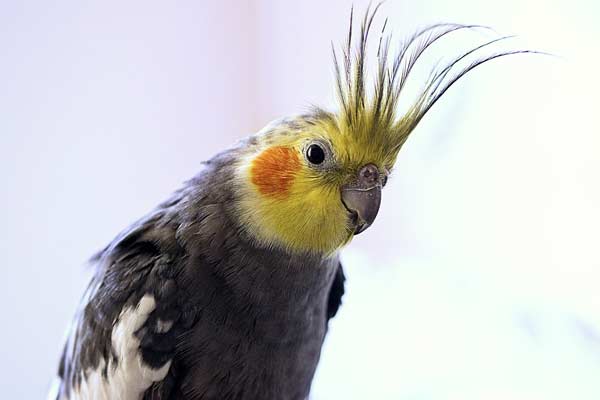A cockatiel is a famous pet bird known for its friendly and social nature. They are relatively easy to care for and can make excellent companion animals. However, they may sometimes bite their cages.
Cage biting is a common behavior problem in pet birds. It can be frustrating to deal with. Here we will discuss why cockatiels may bite their cage and what you can do to stop this behavior.
Lack of Exercise
Cockatiels are active birds and need to have regular opportunities to exercise. If they are cooped up in a small cage all day with no chance to fly or move around, they can become restless and bite their cage.
To help your cockatiel get the exercise he needs, make sure his cage is large enough to fly around and provide him with toys that encourage physical activity, such as climbing ropes or swing sets. It will help if you let him out of his cage for supervised daily playtime.
Lack of Attention
Cockatiels are very social creatures, and they crave attention from their owners. If your cockatiel feels like he’s being ignored, he may start cage-biting to get your attention.
Social interaction is vital for your cockatiel’s mental health. Make sure that you’re spending enough time with him each day.
If you work long hours or are often away from home, consider getting another cockatiel as a companion for your bird. This will help reduce his loneliness and provide him with the social interaction he needs.
Lack of Sleep
Birds need to sleep for around 12 hours each night. They can become cranky and irritable if they don’t get enough sleep.
Cockatiels are especially prone to this problem since they are active during the day and must be in a quiet, dark place to sleep at night.
If your bird’s cage is in a noisy or brightly-lit room, he may not be able to get the rest he needs and may start biting his cage as a result.
To solve this problem, you must ensure your bird’s cage is in a quiet, dark room where he can sleep undisturbed.
Fear or Anxiety
Many things, including loud noises, sudden movements, or environmental changes, can cause fear or anxiety in birds.
A new environment, such as a new home or a new cage, can also be a source of fear or anxiety for birds.
When cockatiels feel scared or anxious, they may bite their cage to escape the situation. If possible, try to figure out what is causing this stress and remove it from the bird’s environment.
The best way to help a cockatiel feel more comfortable is to provide them with a safe hiding place, such as a covered cage or a bird tent.
Hunger or Thirst
If your bird’s food dish is empty or his water bowl is dry, he may start biting his cage to get your attention.
This is especially common in baby birds still learning to eat independently. Ensure your bird always has fresh food and water available. The food dish should be refilled daily, and the water should be changed at least once weekly.
Wild Ways
In the wild, birds use their beaks for various activities such as eating, preening, and building nests. When cockatiels are bored, they may use their beaks similarly to how they would use them in the wild.
This can include cage biting and other destructive behaviors such as feather plucking. To help your cockatiel satisfy his natural urges, provide him with plenty of toys and perches to keep him busy.
These innate behaviors are essential for your cockatiel’s mental well-being, so it’s crucial to find ways to allow him to express them safely and positively.
Dietary Reasons
A mineral deficiency in the diet can often lead to cage-biting behavior. To ensure your cockatiel gets all his nutrients, supplement his diet with fresh fruits and vegetables and quality pellet food.
Female cockatiels also need extra calcium in their diet when they are producing eggs. Snacking the metal in the cage bars can help the bird satisfy this need.
Grooming the Beak and Claws
In the wild, birds spend much time preening and grooming each other. This helps keep their feathers clean and healthy and strengthens the bond between flock mates.
When cockatiels don’t have access to other birds for grooming, they may try to groom themselves by biting their feathers or cage bars.
If your cockatiel is trying to groom, provide him with a bird-safe mirror or toy that he can use to preen himself.
You can also try offering him a branch from a non-toxic tree, such as willow, apple, or pear, to chew on. This will help keep his beak and claws healthy and give him something to do.
Eliminating Cage-Biting Behavior
First, make sure that your cockatiel has plenty of opportunities to socialize. This means providing him with toys and perches, encouraging him to move around and interact with his environment. Spend time interacting with your cockatiel daily.
This can include playing games, teaching tricks, or talking to him. If you have another bird in the house, letting them interact with each other may also help reduce cage-biting behavior.
If you don’t have another bird, consider taking your cockatiel to an avian veterinarian to see if they can help you. If stress or anxiety is the cause, try to identify what might be causing the problem.
If there’s been a recent change in his environment, such as a move or a new pet in the home, try to make the transition as smooth as possible.
If you can’t figure out what’s causing the stress, consider taking your cockatiel to an avian veterinarian for a check-up.
Cage biting can be a frustrating behavior problem, but it’s usually not intentional. You can help your cockatiel overcome this issue and enjoy a happy, healthy life with patience and understanding.
If you are concerned about your bird’s behavior, please consult an avian veterinarian or behaviorist.

